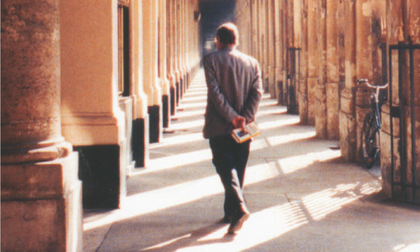John Sturrock (1930-2017)
John Sturrock, writer, critic and translator, passed away on 14th August 2017, aged 87. He was Consulting Editor at the London Review of Books and an editor at the Times Literary Supplement for many years.

John Sturrock was a vital interlocutor between French and English theory of the 20th century, and one of the first early supporters of Jaques Derrida in the 1960s. The Word From Paris: Essays on Modern French Thinkers and Writers was published by Verso in 1999. As Christopher Prendergast writes, the essays “bridge not only two cultures but also two critical styles, the journalistic and the academic”. In Sturrock's trademark style, the collection of essays are generous, lively and forward-looking in their celebration of French philosophy.
We share three extracts from his essay "Jaques Derrida" taken from The Word From Paris here:
Writing is language cast adrift: it exists in the absence of the writer and may be read by millions or by no one at all. Speaking is different: it is language granted the benefit of a living human presence, individualised, ‘felt’. Or so, pre-Derrida, we used comfortably to suppose. His far less comfortable view is that all language is cast adrift by virtue of its being language. Language is structural, a system of relations not of hard-and-fast entities, and hence never unconditionally ‘present’. This is structuralism carried to its logical limit, and Derrida has made the case for it, over and over again, with great virtuosity.
Deconstruction, however, introduced a new element, by appearing, like structuralism before it, to invite the text to analyse itself. The deconstructor was merely the agent through whom its contradictions or incoherences would be revealed. Except of course that deconstruction is a demanding and unusually abstruse mode of analysis, and whoever executes it successfully is more, rather than less, eager to claim the credit for doing so. It is paradoxical, but revealing, that deconstruction should have flourished in a university system, that of the United States, whose teachers are encouraged to make themselves a name by the ancillary articles and books they publish.
Derrida-ism would not have been taken up with such fervour in universities had it not also had a ‘political’ dimension, ‘political’ in scare quotes to show that the ‘politics’ in question are of the academic, not of the more public, variety. This politicisation follows from the attempts he has made to dismantle intellectual hierarchies such as that which I have already cited between speaking and writing. Derrida thought not to reverse this value system but to abolish it, by replacing it with his notion of a pure structurality underlying speaking and writing alike. This was an egalitarian quest he later extended in a number of other profitable directions: into, to take one example, the hierarchical division by which we value the ‘inside’ of something more highly than the ‘outside’.
Extracts from The Word From Paris: Essays on Modern French Thinkers and Writers (Verso, 1999)
Read about John Sturrock at the London Review of Books and the Times Literary Supplement.